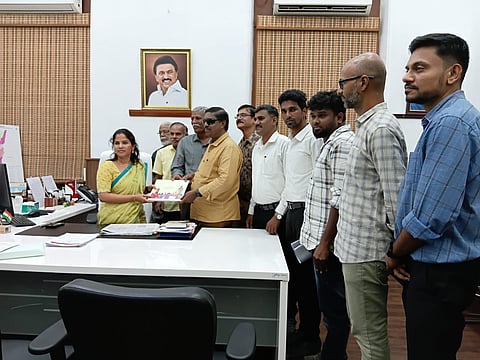

Follow TNM’s WhatsApp channel for news updates and story links.
A delegation led by the Federation of North Chennai Residents Welfare Association, on Thursday, August 28, met the Greater Chennai Corporation (GCC) Mayor R Priya and submitted a proposal for alternatives to Waste to Energy (WtE) plants proposed by the GCC.
The North Chennai Residents Association is a civil society organisation formed against the backdrop of the GCC’s proposal to build a WtE plant at the Kodungaiyur dumpyard to deal with the waste produced by the city. The residents who have been demanding the removal of the dumpyard itself, citing health concerns, are now worried about the effects that the burning of the waste in the WtE plant will have. The GCC has moved ahead with processing for the project.
Waste-to-Energy plants are a controversial technology that promises to use waste as fuel to create electricity. However, the track record of WtE plants in India is abysmal, creating concerns due to noxious emissions as well as the creation of fly ash, which requires dumping as it cannot be processed.
Speaking to TNM, advocate G Sarath Kumar, head of the Vyasai Thozhargal, one of the organisations taking part in the protest against the WtE plant, said that construction materials had already been brought to the site, even before getting a green clearance or conducting public hearings. “One such hearing did happen, but it was not communicated to stakeholders. No one protesting against the WtE plant attended. Another hearing was promised by the Mayor, but construction has already begun,” he alleged.
Now, the North Chennai Residents Association has come up with the Green Chennai Initiative, a comprehensive alternative plan with the goal of complete waste processing to avoid waste ending up in landfills.
The Green Chennai Initiative proposes a zero waste system. “Zero waste is both a goal and a plan of action. The goal is to ensure resource recovery and protect scarce natural resources by ending waste disposal in incinerators, dumps, landfills, etc.,” the guidelines document for the GCI states. “If it cannot be reused, composted, or recycled, it just should not be produced in the first place.”
It endorses a reduction in consumption and a change in production patterns of the city. The step-by-step plan proposed includes the separate collection of waste into red, green and blue bins followed by decentralised processing of organics. Segregated collection, though a part of both the GCC’s 2019 Solid Waste Management By-Laws and the National Solid Waste Management Rules of 2016, is not widely practised in Chennai. The proposed WtE plant makes this issue greater as it proposes burning of the unsegregated waste pile, including non-biodegradable materials, plastic, chemicals, etc.
The document says Chennai’s waste is split between 68% organic waste (5,160 tonnes) – mostly from residential areas – 30% non-biodegradable (1,200 tonnes), and 2% domestic hazardous waste & e-waste (150 tonnes).
The plan calls for decentralised waste management for wet waste at the level of housing units with biogas and composting, followed by 302 units of micro composting centres and 120 units of decentralised biogas plants with five-tonne capacity, and 20 centralised compressed biogas plants of 100 tonnes each.
The report also calls for the phasing out of unsustainable products. “Materials such as single-use paper cups lined with plastics and the Multi Layered Plastics (to name a few) need to be phased out, and the Zero Waste Institute will provide feedback to the industry and the government on policy recommendations to phase out these materials rapidly and replace them with reuse and refill systems.”
According to the report, such a change would create 6,356 new jobs while also creating 3.39 lakh tonnes of organic manure per year and saving the corporation Rs 277 to 338 crore per year and offsetting 1.3 tonnes of carbon.
The plan also requires the setting up of a Zero Waste Institute to study waste that cannot be managed, recycled or safely disposed of to produce research and policies to phase out such materials. Speaking about the plan and the corporation’s response, Cheythenyen S, a researcher and part of the formulation of the Green Chennai initiative, said, “The response that we got from the Mayor is that the corporation would look into it and see if they can implement some of it. The crux of the entire Green Chennai initiative is that it can't go hand in hand with an incinerator. You can't have an incinerator on one side and then say, "We are going to do a Green Chennai initiative. That doesn't work.”